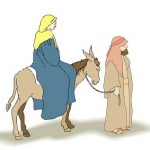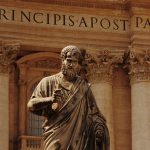Can you imagine what it must be like to be born blind?
- Unable to see the features of family and friends.
- The beauty of the world in which God has placed us.
- To miss out on the colors of the rainbow.
Dr. Sangster tells of the effect of the first successful cornea transplant in the 1940s.
He accompanied two people – a lady who had been born blind and her eye surgeon – to the Surrey Downs in England shortly before sunrise.
Gradually as the layers of bandage were peeled off the blind lady became sensitive to the light and got excited. Moments before sunrise, the last remaining bandage was removed, and she began to witness the glory of a sunrise for the first time.
“With tears streaming down her cheeks she exclaimed: ‘You’ve tried to describe it to me but I never imagined that anything could be so wonderful!’” (Your Quest for God’ by Richard A Bennett – pages 113,114)
The focus of this week’s session is on Jesus’ healing of a blind man.
We find the story in John 9:1-11, 24-41

Photo by Tima Miroshnichenko:
One day Jesus and his disciples encountered a man who had been blind since birth. Seeing him prompted the disciples to ask, “Teacher, why was this man born blind? Was it because he or his parents sinned?”
They saw his impediment as God’s judgment upon either the man himself or more likely his parents for some sin committed.
CLAIM EFFECTED
In responding to their question Jesus put into effect his claim from the previous chapter. “I am the light for the world! Follow me, and you won’t be walking in the dark. You will have the light that gives life.” (John 8:12b CEV)
Jesus answered, No, it was not punishment for sin but rather an opportunity for you to witness a miracle.”
Jesus went on to point out that while here on earth He had to bring light into those areas of darkness. “While I am in the world, I am the light for the world.” (John 9:5 CEV)
They were about to witness Him bringing light into a life that had been clouded in darkness.
BLIND CURED
The cure for this man’s blindness was in Jesus’ actions. After Jesus said this, he spit on the ground. He made some mud and smeared it on the man’s eyes. Then he said, “Go and wash off the mud in Siloam Pool.” (John 9:6,7 CEV) Out of the dust of the ground and his saliva, Jesus formed clay which He placed on the man’s eyes.
‘The clay which the man found suddenly applied to his eyes awakened wonder, hope, expectation, and faith. It was a ladder by which he climbed from the pit of despair to the mount of joy.’ (F B MEYER) Share on XJesus had done his bit but the man still had a part to play in his healing. He was still blind and had to make his shaky way or be assisted to the Pool of Siloam.
As F B Meyer put it, ‘The walk to Siloam was a further venture of faith.’ Only once he had washed his eyes was he able to see.
Often when we present a need to Jesus it is only when we play our part in faith do we receive the complete answer.
CONFUSION
The miracle had taken place but the man was faced with confused unbelief.
For years his friends and neighbors had witnessed him sitting alongside the path begging for a living. Now unexpectedly he was walking unassisted and they, “wondered if he really could be the same man.”
A discussion ensued. “Some of them said he was the same beggar. . . others said he only looked like him.”
- Try to recall an experience you had of looking at a person and thinking “I am sure I know you?”
CYNICAL
The witnesses to his healing were cynical. They couldn’t agree on whether this indeed was the former blind guy or not. He, spoke up “Come on folks, of course, I am that man.”
They responded, ‘You must be joking! Then how can you see?’
“Someone named Jesus made some mud and smeared it on my eyes. He told me to go and wash it off in Siloam Pool. When I did, I could see.”
Unfortunately, this was not the only opposition this man would encounter. Later on in the chapter, we discover that the Pharisees cross-questioned the man about his healing.
They would not accept that healing had occurred, so they asked the man’s parents whether their son had been blind.
This is so often the case. When we experience a great blessing, our adversary immediately tries to rob us of that sense of blessing. He often uses others to sow seeds of doubt.
None so blind as those who will not see. Share on X
The above phrase has its roots in the prophecy of Jeremiah. “Hear this, O foolish and senseless people, who have eyes, but see not, who have ears, but hear not” (Jeremiah 5:21 ESV).
CONFRONTATION
Getting no satisfaction from the parents, the Pharisees once again confronted the man formerly blind.
“Give glory to God. We know that this man is a sinner” (John 9:25 ESV). Again, we have this focus on sin.
The man’s response was along the same lines as Jesus’s response to his disciples, ‘The issue is not about sin it’s about the miracle of healing, ‘I used to be blind, but now I can see!'”
When they pressed him for details of what had happened, he put them on the mat, “Why do you want me to tell you again? Do you also want to become his disciples?”
That shook them and put them on the defensive. “You are that fellow’s disciple, but we are Moses’ disciples. We know that God spoke to Moses; as for that fellow, however, we do not even know where he comes from” (John 9:28b,29 GNB)!
Unfazed, by these religious hypocrites the man pointed out, “We know that God does not listen to sinners; he does listen to people who respect him and do what he wants them to do. Since the beginning of the world, nobody has ever heard of anyone giving sight to a person born blind. Unless this man came from God, he would not be able to do a thing” (John 9:30-33 GNB).
His opponents had no answer to this truth and shrugged it off with, “You were born and brought up in sin—and you are trying to teach us?” And they expelled him from the synagogue (John 9:34 GNB).
Isn’t it amazing? The man has just received the most amazing healing—and he gets expelled–excommunicated! Do we ever turn our backs on someone when they have received a blessing from God? My wife and I have both experienced times when we have been blessed, and our fellow Christians have rejected our experience. How about you? How sad. Let’s be on guard that we don’t fall into this trap.
COMMITMENT
But Jesus did not come into our world to merely bring physical healing. Yes, the man had been healed physically but he still needed spiritual healing. Jesus found the man and asked him, “Do you believe in the Son of Man?”
“Tell me who he is, sir, so that I can believe in him!”
“He is the one who is talking with you now.”
“I believe, Lord!” the man said, and knelt before Jesus. His healing was complete.
COMPLETE CURE
Having cured the formerly blind man both physically and spiritually Jesus then stated his mission on earth. “I came to this world to judge so that the blind should see and those who see should become blind.”
Despite having been put in their place, some Pharisees challenged Jesus’s statement. “Surely you don’t mean that we are blind, too?”
Jesus answered, “If you were blind, then you would not be guilty; but since you claim that you can see, this means that you are still guilty.”
“None so blind as those who will not see”.
Jesus is still in the business of healing – physically, psychologically, mentally, and emotionally. But most definitely His greatest desire is to bring spiritual healing. To bring each of us into a relationship with the Father through belief in Him as our Saviour and Lord.
Paul reminds us, “You yourselves used to be in the darkness, but since you have become the Lord’s people, you are in the light. So you must live like people who belong to the light,..” (Ephesians 5:8 GNB) He (God) rescued us from the power of darkness and brought us safe into the kingdom of his dear Son, (Colossians 1:13 GNB)
Wherever there is an area of darkness in your life, Jesus wants to shed His light. Trust Him, follow His instructions and enjoy living in the light. Reflect on the words as you listen to the song Lord the light of your love is shining.
If you haven’t yet read the Introduction to Encounters with Jesus, please do. It will benefit you throughout this series of studies.














